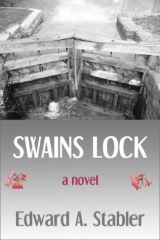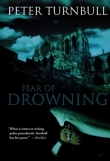
Текст книги "Swains Lock"
Автор книги: Edward A. Stabler
Жанры:
Триллеры
,сообщить о нарушении
Текущая страница: 12 (всего у книги 25 страниц)
“I’ll take that big fish,” he said.
“You bet, mister.” The boy pulled the biggest rockfish from the tub. “Already cleaned him. I’ll wrap him up for you.” He removed two pages from a folded newspaper in his back pocket and used them to wrap the fish, skillfully tucking the ends so that they wouldn’t unravel. “That’s three dollars.”
“Sure, kid.” Kevin unfolded his two bills and looked perplexed before smiling and shaking his head. “I thought I had my whole wad with me, but now I recall that I left it on the boat.” He handed the boy the two dollars. “Here’s two dollars, and I’ll go get you another.” He pointed to the scow, visible now against the towpath. “I better take the fish with me, so he don’t get dried out. Got a bucket I can stick him in.”
“OK, mister,” the boy said, looking thoughtfully down at the two rockfish remaining in his tub. “I’ll wait for you right here.” He handed Kevin the wrapped-up fish.
“Much obliged, son. I’ll be back in a few minutes.” He walked briskly back to the scow, whistling to get Tom’s attention when he reached the towpath. Tom plucked his knife from the deck and looked up as Kevin tossed him the fish. After untying the lines, Kevin jogged up to the mules and gave Mike a slap on the haunch. The mules snorted into their burden and the scow moved on past Fletcher’s.
Chapter 17
Shadow Men
Wednesday, March 26, 1924
At 2:10 am, Tom won the last hand of the evening. He pulled the meager pile from the center of the table and added the coins to his small heap. After five hours of sleep and an hour of coffee and poker, he and Kevin were both back where they started. It was time to head down to Lock 3. Kevin poured shots of whiskey.
“For luck.”
“Better not need any,” Tom muttered. “Just get in, get it off, and get out.”
“And get paid,” Kevin said. “Don’t forget that part.” They drained their whiskey and climbed to the deck to discover rain like fine, soft needles, and suspended water vapor catching ambient light from the city. The area around the scow was unlit, but they could see well enough to work without a lamp. And well enough, they hoped, to steer into the locks.
Through Georgetown the towpath leapfrogged to the north side of the canal and the river was a few blocks to the south. The scow was tied up above Lock 4, and Lock 3 was one block further east, near 30th Street. Kevin and Tom removed hatch 3 and extracted the logs that hid Finn Geary’s two barrels, sliding them back onto the stern hatches. Tom took the tiller as Kevin crossed the fall-board to get the mules ready. They started downstream with their bow-lamp dark.
The dirt towpath had grown wet and Kevin found the footing slippery as mud clung to his soles. Georgetown was at its quietest now and they had already passed the mills, but Kevin still heard distant metallic shrieks, iron striking iron, someone yelling in the distance. The rhythm of mule-hooves slapping wet dirt was the metronome for this nocturnal orchestra. Lock 4 was set for a loaded boat and deserted. Kevin slowed the mules and Tom steered a clear course. They locked through quickly. Ten minutes to three.
Kevin found himself eyeing the warehouses and dirt lots to his left and right as the scow passed Jefferson Street and approached Lock 3. A three-story brick foundry across the canal had been converted into a veterinary hospital for canal mules, and its hulking form loomed over Lock 3 like a giant watchdog. The diffuse glow of a streetlamp splashed onto the front of the hospital, but the side of the building facing the lock was cast into deep shadow. At the base of the shadow a dirt road ran parallel to the canal, and Kevin thought he saw a gleam of metal from the darkness as he drew closer.
He guided the mules past the lower gates and turned to check on the scow. Tom’s course looked good. Kevin snubbed the boat to a stop after it entered the lock. When he looked up, the shadowed veterinary hospital was directly across the canal and he could see the outline of a flatbed truck parked beside it. Two silhouettes leaning against the truck stepped forward. Kevin leapt onto the scow and Tom joined him on deck as the men approached.
The man on the left tilted back his hat-brim so that Kevin and Tom saw a glimmer of white from his eyes. He was taller than either Emory but looked young – barely twenty, Kevin thought. His anemic mustache was a light color and a toothpick bobbed in the corner of his mouth. The second man was Kevin’s height with black sideburns and a dark mole near the tip of his broad nose. Even in the dim light he looked powerfully built.
“You the Emorys?” asked the young man with the toothpick.
“That’s right,” Kevin said. “Who are you?”
“Mr. Geary sent us. We’re supposed to pick up a package for him.”
Tom’s hand drifted toward the knife at his hip. “You got something for us?”
“That’s been taken care of,” said Toothpick. He turned toward Mole-nose. “Get the sling.” Mole-nose walked back to the truck, retrieved a barrel sling, and rejoined Toothpick at the lock wall.
“Let’s go,” Toothpick said.
Kevin hadn’t seen either man before, but he had encountered enough others like them to believe they worked for Finn Geary. He and Tom guided them to hatch 3. The light rain sprinkled the barrels, which lay end to end like enormous oaken eggs in a nest of firewood. Mole-nose unfolded the barrel sling – two six-foot hickory staves connected by three equally-spaced lengths of heavy rope. They worked the ropes under the first barrel, struggled to lift it, and carried it over to the truck.
“Straight to the center,” Toothpick said in a strained voice, guiding Kevin and Tom to the middle of the flatbed. Toothpick synchronized the men and with a grunt they lifted the staves higher, swung the barrel out over the flatbed, and then lowered the sling. Geary’s men jumped onto the truck, set the barrel upright, and wheeled it to the center of the bed.
“Let’s go,” Toothpick said again, leaping down and striding back to the scow. Mole-nose grabbed the sling and followed with Kevin and Tom trailing. Kevin cast a glance across the canal toward the mules. They were nosing around the fringe of the towpath but his eye was drawn beyond them, toward the intersection of the towpath and 30th Street. Two figures were standing on the edge of a dirt lot next to the sidewalk. They were backlit by a streetlamp, and he felt a chill when he recognized the outline of a policeman’s cap on the figure nearest the curb. The man’s clothing seemed to fit snugly, like a uniform. The other man was further from the light, but Kevin could see that he wore a large brimmed hat and a long coat. Did the two men just arrive? If not, Geary’s men should have noticed them, since they could be seen clearly from the truck. It was too late to change anything. With one barrel on the truck and one on the scow – and the lock gates closed – whatever was going to happen was ordained. He followed Geary’s men and Tom back to the open hatch.
They hoisted the second barrel in the sling and humped it over to the truck, this time without words. Toothpick and Mole-nose climbed onto the flatbed and lashed the barrels together, roped them to tie-down rings in the corners, then threw a tarp over them and tied that down as well. Kevin and Tom watched from the adjacent dirt road. When they were finished securing the cargo, Geary’s men hopped down from the truck.
“Well you fellas have a good trip to wherever you belong,” Toothpick said, tilting the brim of his hat forward and acknowledging each Emory. “We got to get moving. You’ll get the barrels back next time.”
“I think you’re forgetting something,” Tom said. His voice was low and hard-edged and his hand eased toward his knife.
Toothpick smiled. He plucked the toothpick from his mouth and addressed Tom slowly, as if talking to an imbecile. “I told you,” he said. “That’s been taken care of.”
Kevin felt a stab of apprehension. Maybe these weren’t Geary’s men after all. And maybe “taken care of” meant something less desirable than being paid. He glanced over his shoulder toward the two figures he’d seen across the canal. The man with the policeman’s cap had moved closer to the scow and Kevin was convinced now that he was wearing a uniform. The other man was gone. Kevin turned back toward the truck and saw Toothpick and Mole-nose walking toward the cab. He sensed a rising fury and saw Tom take a step in their direction, knife in hand.
“I’d put that away if I were you,” said a mellifluous voice from the direction of the scow. “I don’t think you’ll need it.”
Kevin pivoted and watched the man with the large-brimmed hat and long coat approach. He was thickset but moved with an athletic lightness of foot. When the man stopped in front of them, Kevin recognized Finn Geary. His face was pockmarked with craters left by forgotten acne and his nose betrayed a youth spent in a boxing ring, but his eyes were dark and playful. Under his thick mustache, the corners of his mouth curled upward. A gap between his two front teeth contributed to an expression that Kevin interpreted as either bemused or mocking.
Geary pulled an envelope from his coat pocket and handed it to Kevin before advancing to converse with Toothpick, who had climbed into the driver’s seat. Kevin backed away from the flatbed when he heard the engine start. The envelope in his hand was unsealed; he spread it open and saw a thick stack of bills inside. The truck pulled away slowly and Geary rejoined the Emorys.
“You better count it. My accountant gets distracted sometimes.”
Kevin instinctively looked up to check on the position of the figure across the canal. The policeman hadn’t moved and was facing in their direction.
“You don’t have to worry about him,” Geary said without turning to follow Kevin’s gaze. He looked at Tom and Kevin in turn and smiled knowingly. “You just have to worry about me.”
Kevin extracted and counted the bills, brow furrowed as he did the arithmetic in his head. Eight hundred, minus forty, plus fifteen. He looked up at Geary and nodded. “It’s all there.”
“It better be,” Geary said in a serious tone. “And the same goes for your barrels. If what’s on that truck isn’t what you gave Carruthers, you’ll never make it back upriver.” He smiled again. “But you already know that. That’s the nature of the business we’re both in.”
Kevin nodded, glancing back at the scow. Tom shifted impatiently from one leg to the other, and Kevin wondered whether the coffee and whiskey had caught up to him.
Geary tilted his head toward the watching policeman. “Now that guy, there,” he said. “He’s just a working man. He’s like all the other working men beaten down by Prohibition. They can’t afford the clubs for the high-rollers and the politicians.” He looked from Kevin to Tom with his hands thrust deep into his coat pockets. His eyes twinkled and he smiled broadly. “The temperance movement has been a great friend to me,” he said. “And maybe to you as well. But it’s been nothing but a kick in the balls for them.”
He retreated toward the scow with the Emorys following and turned in the middle of the deck to shake their hands. “Stay in touch,” he said with a fleeting smile. He walked off the boat onto the towpath and Kevin watched his figure recede into the shadows.
Chapter 18
Cordwood
Thursday, March 27, 1924
“That’s it for hatch 1,” Kevin said. The afternoon drizzle pricked the back of his neck as he spun in search of stray logs on the wet floor of the cargo hold. Finding none, he climbed out onto the deck and helped Tom put the hatch back in place.
They removed hatch 6 and set it on the roof of the cabin. Here the hold was still full of firewood, and the spitting rain painted the sawn ends of the logs. Tom knelt to extract them, sliding two at a time across the deck to Kevin standing at the rail. Kevin tossed them onto the growing pile of firewood on the bank.
The scow was tied up in Rock Creek Basin, where the mouth of Rock Creek was separated from the Potomac River by a two-hundred-foot-wide dam. Kevin looked out at Mike and Bess, who were tied to a tree in the vacant lot above the bank. They stood motionless in the drizzle – probably asleep, he thought. Two other boats were moored in the basin and both were hauling sand from Smoot’s in Georgetown up to Williamsport, where they were building a power plant. They had been towed by tugboats and entered the basin yesterday through the tidewater lock. Probably waiting on their mules. Kevin arched forward to launch a stream of tobacco juice onto the bank.
“You posing for a statue?” Tom groused. Kevin saw that half-a-dozen logs had accumulated at his feet.
“I didn’t realize we was in a rush,” he said. “Seeing as your visit to Reddy’s wharf don’t seem to have resulted in much of a scheduled appointment.”
“His kid said he was coming today. He’ll be here.”
“His kid don’t know his ass from a slice of melon,” Kevin said. “Seeing as I was negotiating an important inversion of our financial assets into hard money, maybe you could of waited around until Reddy come back, so you could talk to him directly.”
“That kid is old enough to know what’s going on with his daddy. Old enough to work alongside him at the wharf. And shit, the kid loaded two cords of wood hisself on our last trip!”
“That don’t mean he got a brain in his head,” Kevin said. He bent over and pushed two logs together, then lifted and flung them onto the pile on the bank. “He’s like his daddy alright, and Reddy is a bona-fide black darkie.” He hoisted two more as Tom slid replacement logs across the deck. “Not like your copper darkies, which is most of what you will see around here.”
“A darkie is a darkie,” Tom said, bending over the hold. “Ain’t no such difference.”
Kevin turned and wagged his head in rebuttal. “Shows how little you know about things.” He tried to look professorial. “Your black darkie is from jungle Africa,” he said. “He got arms like pythons, which come from swinging on vines. You ever look at the arms on Reddy Bogue? He could probably strangle a calf in the crook of his elbow. And he could grab two of these logs with one hand.”
“All I care about is can he reach that hand in his pocket and pull out some money,” Tom said. “Twenty dollars for seven cords is what I told the kid. And I don’t care if he’s a black darkie, copper darkie, or pine-tar darkie, long as he can do that.”
Kevin tossed two logs to the bank from the growing pile at his feet. “Now your copper darkie,” he said, “got a certain ease to him. He can be comfortable around a white man, and a white man can get comfortable around him.” He paused to adjust his skewed suspenders. “So you might see a copper darkie working at a hotel here in Washington. Or at a newsstand or a shine stand. That’s ‘cause he ain’t by origin a jungle darkie. Your copper darkie come from what they call the high savanna. Which is aerated and not so savage like the jungle. So he don’t need the python arms.”
Observing the logjam accumulating at Kevin’s feet, Tom stood up and stretched, shaking rain from his hat brim. He dug into his coat pocket for his flask and knocked back a swig.
“The way you can tell ‘em apart,” Kevin continued, “is density. Your copper darkie ain’t so dense as your black darkie, ‘cause he got lower muscle perfusion. So he can float in water like a white man. But your black darkie will sink like a stone. And that’s one reason you won’t see no black darkies on the canal. Them boys Cy Elgin used up last year was copper darkies.”
“I heared about a couple of darkies on the canal once,” Tom said, “and I guess they was pretty dark.” He tilted the flask again and shook his head as the alcohol burned his mouth. “It was maybe five, six years ago, and they was boathands on a barge coming down from Cumberland. They got to the Paw Paw Tunnel and the darkies didn’t want to go through. They was scared of a headless man they heared was haunting the tunnel.” He pulled his knife from its hip-sheath and flipped it, catching the handle after a single rotation. “So they got off at the entrance to the tunnel and walked over the mountain.” He flourished the knife for effect. “When they got down to the other side of the tunnel, their tongues was split in two like snakes!”
Kevin issued a low whistle and wiped juice from the corner of his mouth. “Might ‘a been a spell laid on ‘em by some other black darkies.”
“Maybe,” Tom said. “The captain and his other hand couldn’t tell or find out. ‘Cause them darkies was speaking a language that no man ever heard before!”
“Snake-tongue language,” Kevin said, with a knowing nod. “That’s a curse from jungle Africa. They should of taken their chances in the tunnel.”
Tom climbed down into the open hold to pull logs from the diminishing pile. They finished hatch 6 and switched positions. When the logs under hatch 2 were gone, Tom unbuttoned his fly and urinated into the sliver of basin between the scow and the bank. Kevin shuffled over to urinate alongside him. He checked his pocket watch. “Three-thirty. You sure Reddy is coming today?”
“That’s what his kid said yesterday.”
“Damn,” Kevin said, looking at the hillock of logs on the bank. “If he’d got here an hour ago, he could of caught up with us. Them black darkies can work, but that’s getting to be a pretty big pile.”
“Hell, who cares? After he pays us, that pile is his problem. He can spend all night loading his wagon.”
“A one-horse wagon ain’t going to do it. They’ll need to make a few trips.”
“Maybe he can get all his kin to help,” Tom said. “Get three, four wagons, and a whole crew of darkies. Hell, we still got what, twenty gallons left?”
“A little more than twenty.”
“Well maybe we can sell some of it to Reddy.”
Kevin snorted. “Hell no. Last thing we want is a crew of liquored-up black darkies thumping away a few feet from the boat. No telling what could happen. I ain’t never had no trouble with Reddy, but I never seen him drunk, neither. And his kid has some kind of wild look on him already, if you ask me.” He took a swig, then offered the flask to Tom.
“No,” Kevin said, “I think we should try to track down M-Street Reed on our way back through Edwards Ferry. He might take ten or eleven gallons. Of course, we should of caught him on the way down, so we could get rid of his paper down here.”
“A little more paper money won’t kill us.”
Kevin grimaced. “Shit. We got more paper than we need. Even after I go see Morrison tomorrow, we’ll still have over a hundred dollars in paper.”
“So what. You don’t want to be dropping silver dollars on every fleabag canal trader.”
Kevin smiled with feigned indulgence. “I realize that, Tommy. And I took it into account. Don’t forget, we still got seventy-five dollars coming from our friend Cy Elgin. And that will certainly be all paper.” He paused and leered. “Unless he persuades his little sister to offer us some non-monetary favors instead.”
“She’s a looker,” Tom said, “but a shady one. They should throw that in for free. In the spirit of doing good business.”
“I agree completely, Tommy.”
“What hatch you want to work now?”
“Let’s do 4. And then 3, which only has half a load, what with Geary’s barrels gone. Then we’re done. We can leave the wood under 5, since we still got whiskey in that third barrel.” He jerked his head toward the logs on the bank. “That will be close enough to seven cords that Reddy won’t know or care.”
Tom knelt down to slide logs from hatch 4 across the deck. “I still don’t understand,” he said, “what you got against paper money.”
Kevin heaved the logs onto the pile. “What I don’t like,” he said, “is that you don’t know what it’s worth!”
“It says on the bill. Five dollars. Ten dollars. Twenty dollars.”
Kevin rolled his eyes in exasperation. “That’s exactly what they want you to think,” he said. “Right up until the time they tell you it ain’t worth that any more. ‘Cause they changed the name of the bank that’s issuing the bills. Or because you got to exchange all your old green dollars for new dollars that they decided to print in a different color of green.” He spit out his chaw and replaced it with a generous pinch.
“That’s your government at work, Tommy. The same one that brought you Prohibition, amen. They can print money faster than you can count or spend it. They got experts that do nothing but dream up ways to suck more money out of people like you and me. But no matter how smart they are, they can’t print gold, and they can’t print silver. So that’s how I like to hold my money.”
Tom nodded and slung logs toward the rail. “I got no problem with gold and silver,” he said. “Long as we don’t give up too big a cut to get it.”
“Morrison’s charging us six percent on silver and twelve percent on gold,” Kevin said. “That sounds like a lot, but at least you’ll be able to feel the weight of real money in your hand.” He looked out at Mike and Bess and then peered along the dirt access road that led into the grassy lot. Through the gray mist there was no sign of Reddy’s wagon. “Damn, where is that darkie?” he muttered, wiping an errant trickle from his lips.








